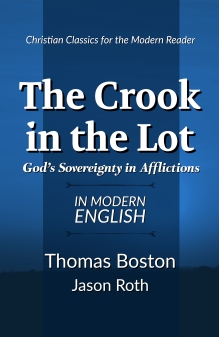 When we go through trials, how do we reconcile our pain with the sovereignty of God? As a Christian, how can we glorify God in our suffering? The Crook in the Lot by Thomas Boston (1676-1732) attempts to answer these questions by looking at scripture. This week, I’ve released a new modern English translation, The Crook in the Lot: God’s Sovereignty in Afflictions: In Modern English. In this article, I’ll provide an overview of Boston’s advice on how to walk through the disappointing and painful parts of our lives.
When we go through trials, how do we reconcile our pain with the sovereignty of God? As a Christian, how can we glorify God in our suffering? The Crook in the Lot by Thomas Boston (1676-1732) attempts to answer these questions by looking at scripture. This week, I’ve released a new modern English translation, The Crook in the Lot: God’s Sovereignty in Afflictions: In Modern English. In this article, I’ll provide an overview of Boston’s advice on how to walk through the disappointing and painful parts of our lives.
Background
Thomas Boston was an 18th century minister and theologian in Scotland. This book was the product of several sermons by Boston during the last decade of his life. It was then published after his death in 1732.
Boston did not speak lightly of suffering, having experienced much in his short life. Of his ten children, only five lived past childhood. Both he and his wife experienced many illnesses and mental struggles. But Boston remained faithful until the end by believing in what the Bible says about God’s sovereignty and love. The book is divided into three parts. Each part can be read and studied independently of the others; however, there are related themes that, like facets of a diamond, are best appreciated when viewed together.
Part 1: Faith in suffering
The pivotal verse for this section comes from Ecclesiastes 7:13: “Consider the work of God: who can make straight what he has made crooked?” (ESV). Boston applies this verse to the disappointing parts of our lot in life. If God, in his sovereignty, has made parts of our lives crooked, then there is no way to make Him to straighten our circumstances by force. This verse is the source of the book’s title, The Crook in the Lot.
At this point, many Christians might object to saying that God has caused their trial, especially if it is the result of others’ sin or the brokenness of a fallen world. Although Boston agrees that God does not sin, he affirms the position of scripture that either by direct action or permission, God has a purpose in all that happens to us (Rom 8:28).
So how does this affect our response? Boston urges us to humbly admit that God is in control of our suffering and has a good purpose in it. But this is not a Christian fatalism. He also urges us to have faith that God can deliver us from our suffering. He tells us to never stop praying for deliverance (Luke 18:1-7). And we should always pray that God would use the crook in our lot to bring us closer to Him. He calls this a “blessed exchange”:
“God never makes any crook in our lot without it being, in effect, heaven’s offer to us of a blessed exchange…God first puts out His hand and takes away some earthly comfort from us; and it is then expected that we put out our hand and take some heavenly thing from Him in its place–particularly His Christ.”
Part 2: Humility in suffering
Part two looks closely at the scenario described in Proverbs 16:19: “Better it is to be of an humble spirit with the lowly, than to divide the spoil with the proud” (KJV). I used the KJV version of the verse here, because he borrows those specific terms throughout this part of the book.
Although it might seem that the proud are content in winning the battle and dividing the spoil, Boston shows how this is an illusion. The proud obtain a temporary victory at the cost of their eternal souls. If we could see what God sees, the humble Christian in the face of loss is far richer. Boston urges us to prioritize and seek humility in our suffering:
“Be more concerned to get your spirit to bend and learn from the cross, than to get the crook in your lot evened.”
He also gives one of his most helpful (and chilling) exhortation to Christians who only desire to have their trials removed:
“Contemplate how dangerous and hopeless it is to have the cross removed before the spirit is humbled…It is to be removed from our trials before we have given any proof of ourselves, as if our physician gave up on us as a hopeless case.”
If we believe God has chosen the trials we experience, we should humbly ask that he accomplishes all of his good purposes through it.
Part 3: The end of suffering
The final section of the book appropriately looks at the promises of scripture that God will lift us out of all of our suffering. “Humble yourselves, therefore, under the mighty hand of God so that at the proper time he may exalt you.” (1 Peter 5:6, ESV). As with the verses in the previous sections, Boston starts with the first half of the verse in the call to humble ourselves. This covers some common ground with the discussion of humility in the other sections.
One area that the modern reader might struggle with is Boston’s claim that we suffer justly as sinners. There is no question that Puritans took sin and holiness more seriously than the average Christian today. But the reader has to decide if Boston takes this emphasis too far in his discussion of suffering or whether he is providing a necessary corrective to our modern attitudes towards sin.
The most encouraging part of this section follows the promise in the second half of the verse. Boston looks at our promised exaltation, which comes “at the proper time.”
Boston first looks at the partial lifting up that we can experience in this life. At any time, God can deliver us from our trials and ease our burdens. Again, Boston encourages us to pray for this. But he cautions us that scripture does not guarantee a lifting up in this world.
But this leads to his final point. In the next life, we are certain of a full lifting up. There will be no more disappointments, pain, or suffering. It is this promised full lifting up that can give us endurance when God delays or denies a lifting up in this life for His good purposes. And when our lifting up comes, it will not wait a second longer than necessary.
“When that complete lifting up comes, we will see that it has come at exactly the best moment. We will agree that it was best that it came neither sooner nor later.”
Conclusion:
The Crook in the Lot challenges our tendency to minimize God’s sovereignty in our suffering. But at the same time, it exalts God’s goodness and love in treating us as sons and daughters. One of our greatest needs is humility, and we only learn that through the discipline of humbling circumstances. Because we are in Christ, we will certainly be lifted up with Him for all eternity!
“Therefore, do not cast away your confidence, whatever humbling circumstances you are in. Rest assured that the humbled will receive a lifting up before long, if not here, then for sure hereafter. Keep this in view and comfort yourselves with it, for God has said it: ‘For the needy shall not always be forgotten, and the hope of the poor shall not perish forever.’ (Ps 9:18). If your night seems ever so long, the morning will come at length.”
Boston, Thomas. The Crook in the Lot: God’s Sovereignty in Afflictions: In Modern English (p. 174). Christian Classics for the Modern Reader. Kindle Edition.

I love this book so much, I’ve bought it for several people. I first bought the Kindle, then had to have a hard copy, and I bought one for my daughter, also. I adore this book.
LikeLike
Thank you so much for letting me know! I am so glad that God is using it.
LikeLike